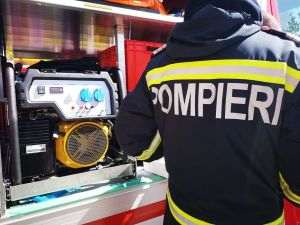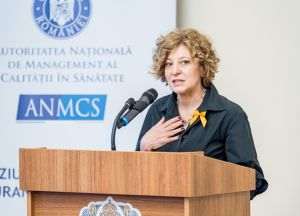• Interview with Mrs. Cristina Chiriac, vice-president of the AVAS
Reporter: How many probes did the AVAS conduct in the post privatization period at Rodipet and what were the irregularities which were found? How would you comment on the statements of the DIICOT concerning the "absence of the post-privatization control"?
Cristina Chiriac: At the time of its privatization, Rodipet was one of the most important companies in the newspaper distribution sector, having a vast network and specialized personnel. The AVAS (APAPS) privatized the company in hope that the investors would find the best solution to help it grow. The current situation of SC RODIPET SA, namely its insolvency, as well as the findings of at the company, and I am referring here to the company's financial and economic status and to the way it was managed during the post-privatization monitoring period, make me feel like things did not exactly go normally.
When we were able to intervene, we did it with a strong hand. The steps taken by the AVAS in this type of situation take time, whether we are talking about sanctions or penalties implemented based on the Privatization Contract, or sanctions taken in court, which produce no tangible effects until their solving, more specifically until the courts issue a ruling.
In referring to the control operation, I want you and the public to understand that the AVAS is a business partner, which has rights as well as obligations. That is why, the AVAS was never able to get involved or to intervene in any other manner than within the limits of the law, in any of the privatized companies, as any such measure could be construed as a violation of the right of ownership and an interference of the state in the private sector. From that point of view, our means of action are limited, and I want to emphasize this, only to some legal procedural actions, such as lawsuits or other similar actions.
The control activity conducted by the AVAS, in general and in particular, from the perspective of SC RODIPET SA, currently SC NETWORK PRESS CONCEPT SA, on one hand considered the prerogatives of the specialized structure of the Authority, more specifically of its Control Department, and on the other hand, the prerogatives of the Post-Privatization Monitoring Department. In other words, the AVAS had and still has the necessary legal mechanisms to control and to investigate the manner in which a company is managed, as well the manner in which a Buyer complies with the contractual obligations. In the case of Rodipet, when it received a notification or when it referred the matter to itself, the Authority conducted four investigations between 2008 and 2009. It is clear what they resulted in: the termination of the contract and the filing of a lawsuit against the Buyer.
The Control Department conducts this kind of actions based on express requests coming from the other specialized structures, and in the presence of concrete elements. These actions check certain aspects, and if violations of the law are found, the AVAS uses certain legal means of action which are available to it, based on specific legislation or on contractual clauses existing in the Privatization Contract and can not implement sanctions or take any other measures, except on the basis of the legal powers which it has been granted.
The AVAS can not overlap over the specific operations of other institutions of the state, which in fact, every time there was a need for it, they were notified and called to intervene. Everything depends on legislation however, and on the powers it grants the AVAS and the manner in which a Buyer wants to cooperate with the Authority or not.
The Department for Post-Privatization monitoring, based on the specific legislation, as well as on the contractual clauses taken on by the Buyer, checks the manner in which in the investors honor their obligations. I want to emphasize that this type of activity is conducted exclusively based on documents made available by the Buyers or requested by the Authority, when this thing is deemed necessary. The legislation in the sector, the contractual clauses, do not allow the AVAS to intervene in any other way in the management of a company, especially after the right of ownership of the shares has been transferred to the buyer.
And concerning the report of the DIICOT which you are talking about, I haven't personally seen it and truth be told, I don't want to say anything or comment on the elements mentioned in it. I just know that currently, in the criminal area and in the area of competence of the national and international civil courts, there are several lawsuits in which the courts must have their say. This situation is causing me to be more reticent when it comes to making comments, but I also reserve the right to note, just like you, that the in the case of RODIPET SA things weren't exactly alright, from the perspective of the Buyer and of its management actions.
Reporter: In an interview with BURSA, one of the defendants claims that the executive manager of RODIPET assured him that in the first four years, the AVAS would confirm that all the post-privatization obligations have been honored. Is it true?
However, in 2009, the former president of the AVAS, Mircea Ursache, said that the ownership of RODIPET would revert to the state, due to the failure of the buyer, the company called MAGNAR TWO, to abide by the provisions of the privatization contract. What led to the decision of Mr. Mircea Ursache?
Cristina Chiriac: As a general procedure, the investments are only confirmed as they have been made. And according to Government Ordinance no. 25/2002, the buyer must "present a certificate issued in that regard by the censors of the company or by a specialized audit firm, unless the contract stipulates otherwise... within 30 days from the deadline coming due". In such a case, the specialized department of the AVAS conducts an analysis of the documents it has on this matter. If all the conditions are met, the note proposing the validation of the investments made by the Buyer is submitted to the Approval of the Board of Directors of the AVAS.
And aside from the matter of investments, in this company we also faced the non-compliance with the social clause. Because in 2008, the union of the company informed the AVAS that the contractual obligations concerning employees were not being met, the AVAS has appointed and sent a control team which was going to verify the facts which it had been notified about; however, the management of the company, like I've already mentioned, did not respond to our requests, nor at its headquarters, nor through official documents.
In such a situation, since no reference documents were sent, the working procedures stipulated by the internal regulations were launched, as the matter of terminating the sale/acquisition contracts was also the responsibility of the Board of Directors of the AVAS.
Therefore, the Post-privatization Contract Monitoring Department drew up and submitted to the Board of Directors "The note concerning the proposal for the enforcement of the real estate collateral and the termination of the contract with a request for punitive damages, as a result of the effects of the commissory pact, of the contract for the sale of shares no. 62/2003 concerning SC RODIPET SA". Through the Decision no. 7 of March 17th, 2009, The Board of Directors of the AVAS approved this Note, and the concerned departments of the AVAS proceeded to the application of the provisions of the note in question.
Therefore, in the case of RODIPET, the specific internal procedures were rigorously applied. Mr. Mircea Ursache , the president of the institution at the time wanted the regulations to be abided with.
Reporter: Magnar TWO, which belongs to the Awadi brothers, filed a lawsuit against the Romanian state, specifically the AVAS, at the International Centre for Settlement of Investment Disputes (ICSID). What stage is the lawsuit currently in?
Cristina Chiriac: The ICSID has on the docket the case ARB 10/13, in which the Romanian state is a defendant, and the plaintiffs are Hassan Awdi and Entreprise Business Consultants, Inc El Corporation.
In 2010, during the home and the headquarters searches, as well as in other locations targeted by the investigators, some documents were seized. During the legal procedures, the plaintiffs requested access to those documents, and the ICSID asked the Romanian state to grant them the requested term.
At the current moment, the case is currently in the document accessing stage. After that, the plaintiffs will have the possibility of concretely formulating their claims against the Romanian state, and the lawsuit will continue, according to the law.
















































